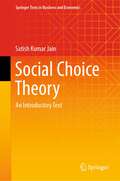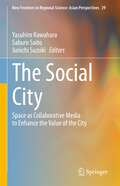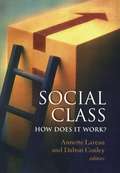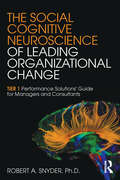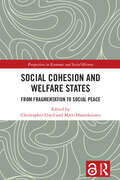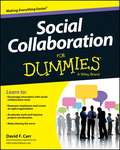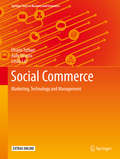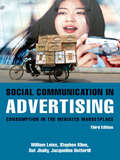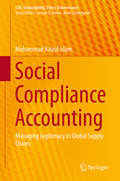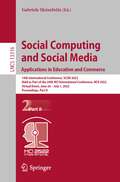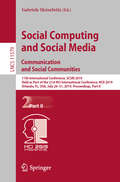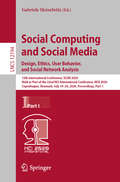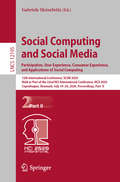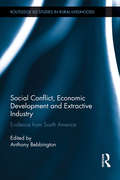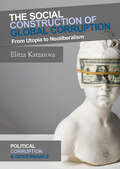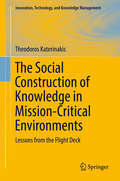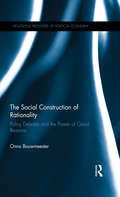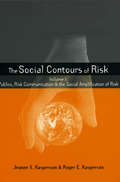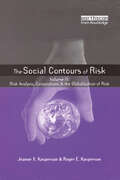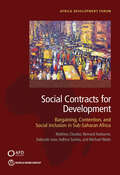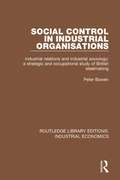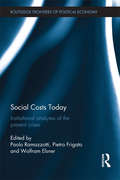- Table View
- List View
Social Choice Theory: An Introductory Text (Springer Texts in Business and Economics)
by Satish Kumar JainThis introductory textbook on social choice theory makes the social choice theoretic framework and its main results, that have a direct bearing on the discourses on electoral rules and policy evaluation, accessible to a larger audience. The text is essentially self-contained. No previous knowledge of mathematical logic or relational algebra is assumed. Whatever technical prerequisites are needed, are developed in the text itself. Although the text is at an introductory level, there has been no compromise on rigor. Unlike most introductory books, the relevant proofs are not omitted; rather, they have been explained in detail. The text has a large number of examples so that the concepts and results become clear to the reader. There is a large number of exercises with full solutions provided at the end of the text, so that the reader can check her/his understanding of the material.
The Social City: Space as Collaborative Media to Enhance the Value of the City (New Frontiers in Regional Science: Asian Perspectives #39)
by Yasuhiro Kawahara Saburo Saito Junichi SuzukiThis book is the first coherent presentation of the latest research and practices concerned with how recent advances in mobile information and communication technology (ICT) and the Internet of Things (IoT) are utilized to enhance the value of the city and change the way that city planning and management are carried out. Its salient feature is the pursuit of the individual-oriented evaluative point of view regarding the city. This view considers the value of the city to be the total of visit-values individuals feel and appreciate when they visit the city. The visit-value is conceptualized as the intangible asset value of the attractiveness of the city that visitors form in their minds based on their experiences and activities in the city, transactions with city space, and communications with other people. Visitors to the city may well be quite heterogeneous individuals with different motives and preferences. Thus, to enhance the value of the city, quite different visit values of heterogeneous individuals should be enhanced simultaneously, which necessitates the use of ICT and IoT in living spaces. Based on this view, the city utilizing ICT and IoT to enhance the value of the city is called the social city. Whereas many other books deal with the impacts of the advances in mobile ICT on the city, they only discuss how these advances change the infrastructure of the city but do not discuss how these technological advances can be utilized to enhance the city’s value. This book first develops the concept of the social city based on an individual micro-behavioral approach. Then, it presents the latest studies on technological components of the social city, such as the human-sensing technology for estimating individual behavior, decision making, and mood; the visualizing technology of the thermal 3-dimensional environment of the city; and the social-sensing technology using social networking service (SNS) for measuring and creating an atmosphere of city space. Finally, it envisages the future of the social city.
Social Class: How Does It Work?
by Annette Lareau Dalton ConleyClass differences permeate the neighborhoods, classrooms, and workplaces where we lead our daily lives. But little is known about how class really works, and its importance is often downplayed or denied. In this important new volume, leading sociologists systematically examine how social class operates in the United States today. Social Class argues against the view that we are becoming a classless society. The authors show instead the decisive ways social class matters—from how long people live, to how they raise their children, to how they vote. The distinguished contributors to Social Class examine how class works in a variety of domains including politics, health, education, gender, and the family. Michael Hout shows that class membership remains an integral part of identity in the U.S.—in two large national surveys, over 97 percent of Americans, when prompted, identify themselves with a particular class. Dalton Conley identifies an intangible but crucial source of class difference that he calls the “opportunity horizon”—children form aspirations based on what they have seen is possible. The best predictor of earning a college degree isn’t race, income, or even parental occupation—it is, rather, the level of education that one’s parents achieved. Annette Lareau and Elliot Weininger find that parental involvement in the college application process, which significantly contributes to student success, is overwhelmingly a middle-class phenomenon. David Grusky and Kim Weeden introduce a new model for measuring inequality that allows researchers to assess not just the extent of inequality, but also whether it is taking on a more polarized, class-based form. John Goldthorpe and Michelle Jackson examine the academic careers of students in three social classes and find that poorly performing students from high-status families do much better in many instances than talented students from less-advantaged families. Erik Olin Wright critically assesses the emphasis on individual life chances in many studies of class and calls for a more structural conception of class. In an epilogue, journalists Ray Suarez, Janny Scott, and Roger Hodge reflect on the media’s failure to report hardening class lines in the United States, even when images on the nightly news—such as those involving health, crime, or immigration—are profoundly shaped by issues of class. Until now, class scholarship has been highly specialized, with researchers working on only one part of a larger puzzle. Social Class gathers the most current research in one volume, and persuasively illustrates that class remains a powerful force in American society.
The Social Cognitive Neuroscience of Leading Organizational Change: TiER1 Performance Solutions' Guide for Managers and Consultants
by Robert A. SnyderIn a very understandable, practical, and accessible manner, this book applies recent groundbreaking findings from behavioral neuroscience to the most complex and vexing challenges in organizations today. In particular, it addresses managing large-scale organizational changes, such as mergers and acquisitions, providing lessons and tactics that can be usefully applied to in many different settings. In addition to discussing successful practices, it also identifies the reasons that most past comprehensive, long-term change projects have failed and unmasks the counterproductive effects of the typical evolutionary or emotion-based attempts to change group and individual behavior, using neuroscience as its principal tool.
Social Cohesion and Welfare States: From Fragmentation to Social Peace (Perspectives in Economic and Social History)
by Christopher Lloyd Matti HannikainenAiming to go beyond reiterating the stereotypical narrative of the rise of welfare states, this interdisciplinary book examines the long-run historical processes of the development of the welfare state. It focuses on the complex political, social, economic and institutional transformations which give rise to these peaceful and cohesive societies. Welfare is crucial to the story of peaceful social integration and this book explores and explains this vital connection, taking a non-linear view of the history of moving from fragmentation to peace with comprehensive welfare institutions. Chapters collectively focus on three central areas: (a) types of socio-political fragmentation, (b) the interconnection of social, political, and economic forces that led to the institutionalisation of integrationist processes and policies (including re-distributional welfare systems), and (c) how this new institutional development helped achieve, or failed to achieve, social peace and welfare. The international panel of expert contributors provide case studies from a rich variety of country contexts, including Germany, South Africa, the Netherlands, Austria, and the Nordic Countries. This thought-provoking collection of essays is well suited for advanced students and researchers in social history, economic history, political economy and social policy.
Social Collaboration For Dummies
by David F. CarrRealize the potential of social collaboration in business with this easy-to-understand guideSocial media have proven to be an engaging and addictive mode of communication and information gathering for users on a personal level. However, by applying that same philosophy, a corporate collaboration system that employs social technologies could potentially get employees more involved in running an efficient and effective business. This fun and friendly guide shows you exactly how to put social networking to work in order to achieve business goals. Taking you beyond just the features and tools of social collaboration, the book focuses on where and how social collaboration principles and technologies can be applied in order to enhance the performance of an organization, regardless of how big or small it may be.Helps businesses understand how to introduce social collaboration practices into their organizations in order to create the results they are seekingDetails ways to transform a business into a social business by using social collaboration technologiesProvides case studies that exemplify ways in which business can engage and learn in social collaboration Social Collaboration For Dummies is an ideal introductory guide for anyone looking to use social collaboration to lead to improvements in productivity, organizational agility, innovation, and employee engagement.
Social Commerce
by Efraim Turban Judy Strauss Linda LaiThis is a multidisciplinary textbook on social commerce by leading authors of e-commerce and e-marketing textbooks, with contributions by several industry experts. It is effectively the first true textbook on this topic and can be used in one of the following ways: Textbook for a standalone elective course at the undergraduate or graduate levels (including MBA and executive MBA programs) Supplementary text in marketing, management or Information Systems disciplines Training courses in industry Support resources for researchers and practitioners in the fields of marketing, management and information management The book examines the latest trends in e-commerce, including social businesses, social networking, social collaboration, innovations and mobility. Individual chapters cover tools and platforms for social commerce; supporting theories and concepts; marketing communications; customer engagement and metrics; social shopping; social customer service and CRM contents; the social enterprise; innovative applications; strategy and performance management; and implementing social commerce systems. Each chapter also includes a real-world example as an opening case; application cases and examples; exhibits; a chapter summary; review questions and end-of-chapter exercises. The book also includes a glossary and key terms, as well as supplementary materials that include PowerPoint lecture notes, an Instructor's Manual, a test bank and five online tutorials.
Social Communication in Advertising: Consumption in the Mediated Marketplace
by William Leiss Stephen Kline Sut Jhally Jackie BotterillNow available in a significantly updated third edition to address new issues such as the Internet and globalization, Social Communication in Advertising remains the most comprehensive historical study of advertising and its function within contemporary society. It traces advertising's influence within three key social domains: the new commodities industry, popular culture, and the mass media that manages the constellation of images that unifies all three. The third edition includes: * discussion of new technologies and issues, from the Internet to globalization * updated and expanded examples and illustrations * revisions throughout to address recent developments in advertising scholarship and the latest trends in advertising practice
Social Compliance Accounting
by Muhammad Azizul IslamThis book covers key discussions involving major US and European multinational companies (MNCs) that source products from suppliers in developing countries. Due to the transfer of production from developed to developing nations, there is an urgent need to establish social compliance as a new form of Corporate Social Responsibility (CSR) and a means by which MNCs can meet expected social standards. The cases described are internationally relevant and can be seen to reflect or represent the behavior of many MNCs and their suppliers in developing nations. The discussion offers essential insights into how different levels of social compliance risk and pressure (including broader stakeholder concerns) move managers to adopt or embrace particular social compliance accounting, reporting and auditing strategies. The book will help readers to understand the major concerns, challenges and dilemmas faced by management in the supply chains of MNCs, and proposes measures that can be taken to resolve those dilemmas. Most importantly, it develops a systematic method of assessing the social compliance performance of suppliers to MNCs. This includes highly detailed accounts of the social compliance performance of suppliers within the clothing industry (in a developing nation) that supply goods to the extensive US and European markets. The book offers a valuable guide, not only for corporate managers but also for practitioners, researchers, academics, and undergraduate and postgraduate business students.
Social Computing and Social Media: 14th International Conference, SCSM 2022, Held as Part of the 24th HCI International Conference, HCII 2022, Virtual Event, June 26 – July 1, 2022, Proceedings, Part II (Lecture Notes in Computer Science #13316)
by Gabriele MeiselwitzThis two-volume set LNCS 13315 and 13316 constitutes the refereed proceedings of the 14th International Conference on Social Computing and Social Media, SCSM 2022, held as part of the 24rd International Conference, HCI International 2022, which took place in June-July 2022. Due to COVID-19 pandemic the conference was held virtually.The total of 1276 papers and 275 posters included in the 40 HCII 2022 proceedings volumes was carefully reviewed and selected from 5583 submissions. The papers of SCSM 2022, Part II, are organized in topical sections named: social media in education; customer experience and consumer behavior.
Social Computing and Social Media. Communication and Social Communities: 11th International Conference, SCSM 2019, Held as Part of the 21st HCI International Conference, HCII 2019, Orlando, FL, USA, July 26-31, 2019, Proceedings, Part II (Lecture Notes in Computer Science #11579)
by Gabriele MeiselwitzThis two-volume set LNCS 11578 and 11579 constitutes the refereed proceedings of the 11th International Conference on Social Computing and Social Media, SCSM 2019, held in July 2019 as part of HCI International 2019 in Orlando, FL, USA. HCII 2019 received a total of 5029 submissions, of which 1275 papers and 209 posters were accepted for publication after a careful reviewing process. The 81 papers presented in these two volumes are organized in topical sections named: Social Media Design and Development, Human Behaviour in Social Media, Social Network Analysis, Community Engagement and Social Participation, Computer Mediated Communication, Healthcare Communities, Social Media in Education, Digital Marketing and Consumer Experience.
Social Computing and Social Media. Design, Ethics, User Behavior, and Social Network Analysis: 12th International Conference, SCSM 2020, Held as Part of the 22nd HCI International Conference, HCII 2020, Copenhagen, Denmark, July 19–24, 2020, Proceedings, Part I (Lecture Notes in Computer Science #12194)
by Gabriele MeiselwitzThis two-volume set LNCS 12194 and 12195 constitutes the refereed proceedings of the 12th International Conference on Social Computing and Social Media, SCSM 2020, held as part of the 22nd International Conference, HCI International 2020, which was planned to be held in Copenhagen, Denmark, in July 2020. The conference was held virtually due to the COVID-19 pandemic. The total of 1439 papers and 238 posters have been accepted for publication in the HCII 2020 proceedings from a total of 6326 submissions. SCSM 2020 includes a total of 93 papers which are organized in topical sections named: Design Issues in Social Computing, Ethics and Misinformation in Social Media, User Behavior and Social Network Analysis, Participation and Collaboration in Online Communities, Social Computing and User Experience, Social Media Marketing and Consumer Experience, Social Computing for Well-Being, Learning, and Entertainment.
Social Computing and Social Media. Participation, User Experience, Consumer Experience, and Applications of Social Computing: 12th International Conference, SCSM 2020, Held as Part of the 22nd HCI International Conference, HCII 2020, Copenhagen, Denmark, July 19–24, 2020, Proceedings, Part II (Lecture Notes in Computer Science #12195)
by Gabriele MeiselwitzThis two-volume set LNCS 12194 and 12195 constitutes the refereed proceedings of the 12th International Conference on Social Computing and Social Media, SCSM 2020, held as part of the 22nd International Conference, HCI International 2020, which was planned to be held in Copenhagen, Denmark, in July 2020. The conference was held virtually due to the COVID-19 pandemic. The total of 1439 papers and 238 posters have been accepted for publication in the HCII 2020 proceedings from a total of 6326 submissions. SCSM 2020 includes a total of 93 papers which are organized in topical sections named: Design Issues in Social Computing, Ethics and Misinformation in Social Media, User Behavior and Social Network Analysis, Participation and Collaboration in Online Communities, Social Computing and User Experience, Social Media Marketing and Consumer Experience, Social Computing for Well-Being, Learning, and Entertainment.
Social Conflict, Economic Development and the Extractive Industry: Evidence from South America (Routledge Iss Studies In Rural Livelihoods Ser. #9)
by Anthony BebbingtonThe extraction of minerals, oil and gas has a long and ambiguous history in development processes – in North America, Europe, Latin America and Australasia. Extraction has yielded wealth, regional identities and in some cases capital for industrialization. In other cases its main heritages have been social conflict, environmental damage and underperforming national economies. As the extractive economy has entered another boom period over the last decade, not least in Latin America, the countries in which this boom is occurring are challenged to interpret this ambiguity. Will the extractive industry yield, for them, economic development, or will its main gifts be ones of conflict, degradation and unequal forms of growth. This book speaks directly to this question and to the different ways in which Latin American countries are responding to the challenge of extractive industry. The contributors are a mixture of geographers, economists, political scientists, development experts and anthropologists, who all draw on sustained field work in the region. By digging deep into both national and local experiences with extractive industry they demonstrate the ways in which it transforms economies, societies, polities and environments. They pay particular attention to the social conflict that extraction consistently produces, and they ask how far this conflict might usher in political and institutional changes that could lead to a more productive relationship between extraction and development. They also ask whether the existence of left-of-centre governments in the region changes the relationships between extractive industry and development. The book makes clear the immense difficulties that countries and regional societies face in harnessing extractive industry for the collective good. For the most part the findings question the wisdom of the development model that many countries in the region have taken up and which emphasises the productive roles of mining and hydrocarbon industries. The book should be of interest to students and researchers of Development Studies, Geography, Politics and Political Economy, as well as Anthropology.
Social Consequences of Economic Restructuring in the Textile Industry: Change in a Southern Mill Village (Transnational Business and Corporate Culture: Problems and Opportunities)
by Cynthia D. AndersonFirst Published in 2001. Routledge is an imprint of Taylor & Francis, an informa company.
The Social Construction of Global Corruption: From Utopia to Neoliberalism (Political Corruption and Governance)
by Elitza KatzarovaThis book offers new ways of thinking about corruption by examining the two distinct ways in which policy approaches and discourse on corruption developed in the UN and the OECD. One of these approaches extrapolated transnational bribery as the main form of corrupt practices and advocated a limited scope offense, while the other approach tackled the broader structure of the global economic system and advocated curbing the increasing power of multinational corporations. Developing nations, in particular Chile, initiated and contributed much to these early debates, but the US-sponsored issue of transnational bribery came to dominate the international agenda. In the process, the ‘corrupt corporation’ was supplanted by the ‘corrupt politician’, the ‘corrupt public official’ and their international counterpart: the ‘corrupt country’. This book sheds light on these processes and the way in which they reconfigured our understanding of the state as an economic actor and the multinational corporation as a political actor.
The Social Construction of Knowledge in Mission-Critical Environments: Lessons from the Flight Deck (Innovation, Technology, and Knowledge Management)
by Theodoros KaterinakisThis volume analyzes real in-flight communications to explain the dynamics of knowledge construction. With the use of a grounded theory approach, real-life scenarios for in-depth interviews with aviation informants were developed and analyzed using discourse analysis. The study revealed aspects of tacit knowledge and expertise behavior that develop in mission-critical environments. Among the findings, the author discovered:• Silence is an interactional element and a substantial contributing factor to both completed flights and aviation incidents/accidents• Hesitation is an early reaction when situational awareness is lacking • The aviation sub-cultures contain several distinct micro-cultures which affect professional responsibility and decision making in micro-environments• Human errors should be acknowledged, discussed and repaired by all actors of the flight model • Non-verbal communication in institutional settings and mediated environments is instrumental to safe and efficient operations The results suggest fruitful applications of theory to explore how knowledge is generated in highly structured, high-risk organizational environments, such as hospitals, nuclear plants, battlefields and crisis and disaster locations. Katerinakis explains the emergent knowledge elements in communication command with messages “spoken-heard-understood-applied," from multiple stakeholders... The interplay of theory and real-flight examples, with key interlocutors, creates a valuable narrative both for the expert reader and the lay-person interested in the insights of hospitals, nuclear plants, battlefields, safety and rescue systems, and crisis and disaster locations.Ilias Panagopoulos, PhDCommand Fighter Pilot, Col (Ret)Senior Trainer, Joint Aviation Authorities (JAA) Training OrganisationSafety Manager, NATO Airlift Management ProgrammeIn this path-breaking work, Theodore Katerinakis brings the study of human communication to the airplane cockpit as a knowledge environment. Toward that end, drawing on his own experience with the Air Force and Aviation Authorities and interviews with flight controllers and scores of pilots, Katerinakis both builds on moves beyond human factors research and ecological psychology… It is a work of theoretical value across disciplines and organizational settings and of practical importance as well. His lively narrative adds to translational research by translating knowledge or evidence into action in mission-critical systems.Douglas V. Porpora, PhDProfessor of Sociology & DirectorCommunication, Culture and Media Drexel University
The Social Construction of Management: Texts And Identities (Routledge Studies in Management, Organizations and Society)
by Nancy HardingWhat is management and how do the people who become managers take on a managerial identity?How does text inform the manager's identity?From cultural studies we understand that the relationship between text and reader is not passive but that each one works upon the other, and that text is active in forming the identity of the reader. This books is the first to analyse how many management textbooks construct their readers. It analyses management textbooks published since the 1950s and shows they construct a world in which chaos is kept at bay only by strong management, and in which strong management is based upon the rationality of modernity. This book exposes and analyses such claims-to-truths, and theorizes their arguments using the work of Butler and Foucault, the sociology of scientific knowledge, critical legal studies, art history and queer theory. By revealing a postmodern turn in management textbooks, The Social Construction of Management is both a critical and empirical study that explores the constitution of managerial identities in the age of mass education in management. An exciting contribution to the growing body of knowledge within critical management studies, this book challenges the way we think about organizations and their management, and about management education as a whole. This is thought provoking reading for anyone studying management, or working in the managerial organization.
The Social Construction of Rationality: Policy Debates and the Power of Good Reasons (Routledge Frontiers of Political Economy)
by Onno BouwmeesterThere are many different forms of rationality. In current economic discourse the main focus is on instrumental rationality and optimizing, while organization scholars, behavioural economists and policy scientists focus more on bounded rationality and satisficing. The interplay with value rationality or expressive rationality is mainly discussed in philosophy and sociology, but never in an empirical way. This book shows that not one, but three different forms of rationality (subjective, social and instrumental) determine the final outcomes of strategic decisions executed by major organizations. Based on an argumentation analysis of six high-profile public debates, this book adds nuance to the concept of bounded rationality. The chapters show how it is socially constructed, and thus dependent on shared beliefs or knowledge, institutional context and personal interests. Three double case studies investigating the three rationalities illustrate how decision makers and stakeholders discuss the appropriateness of these rationalities for making decisions in different practice contexts. The first touches more on personal concerns, like wearing a niqab or looking at obscene art exposed in a public environment; the second investigates debates on improving the rights and position of specific minorities; and the third is based on the agreement on instrumental reasons for two kinds of investments, but the cost arguments are regarded less relevant when social norms or personal interests are violated. The Social Construction of Rationality is for those who study political economy, economic psychology and public policy, as well as economic theory and philosophy.
Social Contours of Risk: Volume I: Publics, Risk Communication and the Social (Earthscan Risk in Society)
by Roger E. Kasperson Jeanne KaspersonWe live in a 'risk society' where the identification, distribution and management of risks, from new technology, environmental factors or other sources are crucial to our individual and social existence. In The Social Contours of Risk, Volumes I and II, two of the world's leading and most influential analysts of the social dimensions of risk bring together their most important contributions to this fundamental and wide-ranging field. Volume I collects their fundamental work on how risks are communicated among different publics and stakeholders, including local communities, corporations and the larger society. It analyses the problems of lack of transparency and trust, and explores how even minor effects can be amplified and distorted through media and social responses, preventing effective management. The final section investigates the difficult ethical issues raised by the unequal distribution of risk depending on factors such as wealth, location and genetic inheritance - with examples from worker and public protection, facility-siting conflicts, transporting hazardous waste and widespread impacts such as climate change. Volume II centres on the analysis and management of risk in society, in international business and multinationals, and globally. The 'acceptability' of risk to an individual depends on the context, whether the larger society or in, for example, a corporate framework. Their work clarifies the structures and processes for managing risks in the private sector and the factors that produce or impede effective decisions. The authors demonstrate that corporate culture is crucial in determining risk management. They analyse the transfer of corporate risk management systems from industrial to developing countries, and how globalization is spreading and creating new kinds of risk - the combination of traditional and modern hazards presented by climate change, technology transfer and economic growth. They describe the new priorities and capacities needed to deal with these enhanced vulnerabilities around the globe.
Social Contours of Risk: Two volume Set (Earthscan Risk in Society)
by Roger E. Kasperson Jeanne KaspersonWe live in a 'risk society' where the identification, distribution and management of risks, from new technology, environmental factors or other sources are crucial to our individual and social existence. In The Social Contours of Risk, Volumes 1 and 2, two of the world's leading and most influential analysts of the social dimensions of risk bring together their most important contributions to this fundamental and wide-ranging field. Volume II centres on the analysis and management of risk in society, in international business and multinationals, and globally. The 'acceptability' of risk to an individual depends on the context, whether the larger society or in, for example, a corporate framework. Their work clarifies the structures and processes for managing risks in the private sector and the factors that produce or impede effective decisions. The authors demonstrate that corporate culture is crucial in determining risk management. They analyse the transfer of corporate risk management systems from industrial to developing countries, and how globalization is spreading and creating new kinds of risk - the combination of traditional and modern hazards presented by climate change, technology transfer and economic growth. They describe the new priorities and capacities needed to deal with these enhanced vulnerabilities around the globe.
Social Contracts for Development: Bargaining, Contention, and Social Inclusion in Sub-Saharan Africa (Africa Development Forum)
by Mathieu Cloutier Bernard Harborne Deborah Isser SantosSub-Saharan Africa has achieved significant gains in reducing the levels of extreme poverty in recent decades, yet the region continues to experience challenges across the development indicators, including energy access, literacy, delivery of services and goods, and jobs skills, as well as low levels of foreign direct investment. Exacerbating the difficulties faced by many countries are the sequelae of conflict, such as internal displacement and refugee migration. Social Contracts for Development: Bargaining, Contention, and Social Inclusion in Sub-Saharan Africa builds on recent World Bank attention to the real-life social and political economy factors that underlie the power dynamic and determine the selection and implementation of policies. Applying a social contract approach to development policy, the authors provide a framework and proposals on how to measure such a framework to strengthen policy and operational engagements in the region. The key message is that Africa’s progress toward shared prosperity requires looking beyond technical policies to understand how the power dynamics and citizen-state relations shape the menu of implementable reforms. A social contract lens can help diagnose constraints, explain outbreaks of unrest, and identify opportunities for improving outcomes. Social contract assessments can leverage the research on the nexus of politics, power relations, and development outcomes, while bringing into focus the instruments that underpin state-society relations and foster citizen voice. Social contracts also speak directly to many contemporary development trends, such as the policy-implementation gap, the diagnostic of binding constraints to development, fragility and conflict, taxation and service delivery, and social protection. The authors argue that policies that reflect the demands and expectations of the people lead to more stable and equitable outcomes than those that do not. Their focus is on how social contracts are forged in the region, how they change and why, and how a better understanding of social contracts can inform reform efforts. The analysis includes the additional impact of the COVID-19 (coronavirus) pandemic on government-citizen relationships.
Social Control in Industrial Organisations: Industrial Relations and Industrial Sociology: A Strategic and Occupational Study of British Steelmaking (Routledge Library Editions: Industrial Economics #31)
by Peter BowenBased on an industrial relations case study conducted in a British Steel plant in the north east coast iron and steel industry, this book, first published in 1976, is an account of the application of sociological concepts and ideas to the process of social relations between employer and employee, and between all types of workers in industrial organisations.
Social Costs and Public Action in Modern Capitalism: Essays Inspired by Karl William Kapp's Theory of Social Costs (Routledge Frontiers of Political Economy)
by Wolfram Elsner Pietro Frigato Paolo RamazzottiThe Social Costs approach to the globalised capitalist market economy has gained new relevance in recent years. The present situation is one of widespread and increasing deterioration of the social, cultural, democratic, and environmental frameworks of advanced capitalist market societies. This deterioration is indicated by the threats of unemployment, precarious working conditions and increasing income/status inequality, uneven geographical developments, and the exploitation and undermining of the institutional fabric of the society. It is aggravated by the rapid extension - at local, national, regional and global scales - of ecological disruption. So the global capitalist market economy is characterised by a great deal of instability and so-called true uncertainty, which largely undermine its coordinating and welfare-enhancing capacity. The view suggested by Karl William Kapp’s seminal evolutionary open-systems approach is that these processes and problems are the outcome of a widening gap between private individualist economic, and societal values or, to use Karl Polanyi’s terms, of the ever increasing disembeddedness of the economy from society and of the subjugation of society to the economy. The key actor in this process is business or, more specifically, it is the increasingly dominant, globalised, deregulated and disembedded hierarchical and power system of business enterprise. Current analyses of the global capitalist market economy are overdue to be undertaken making use of the powerful analytic frame of Karl William Kapp’s open systems economics. ‘Social Costs and Public Action in Modern Capitalism’ examines this approach from a theoretical, conceptual, empirical, policy and case study level.
Social Costs Today: Institutional Analyses of the Present Crises (Routledge Frontiers Of Political Economy Ser. #158)
by Paolo Ramazzotti Pietro Frigato Wolfram ElsnerThis book deals with the current crises from a somewhat different the usual perspectives. It claims that causes and policy implications of these crises cannot be properly assessed by focusing on allocative efficiency or income growth alone; it requires a more general approach, based on social costs. It does not deal with social costs according to the Pigouvian or the Coasian traditions. It draws on the work of Original Institutional Economics (OIE) such as Thorstein Veblen, Karl William Kapp, and Karl Polanyi, on Post-Keynesians such as Hyman Minsky and, in general, on authors who have provided insights beyond the conventional wisdom of economic thought.
